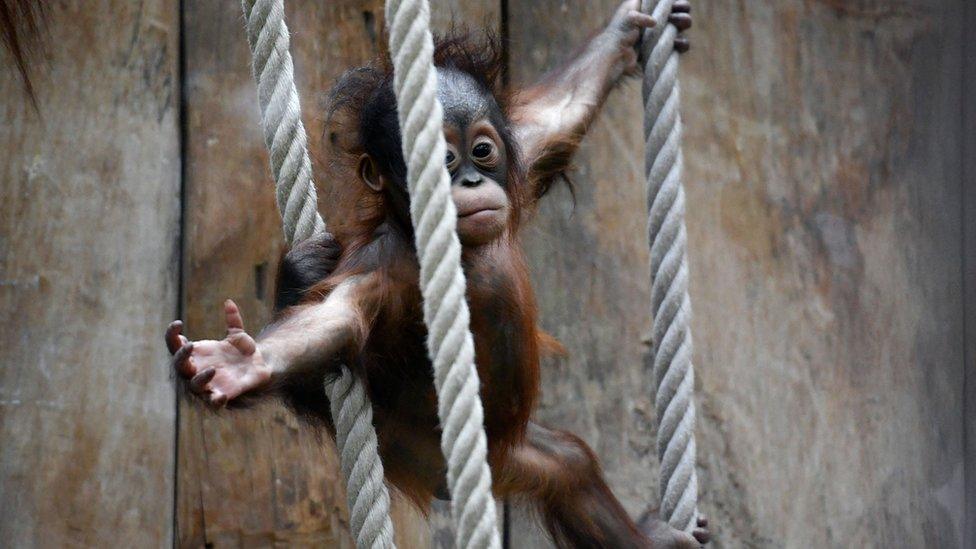Apes spin around making themselves dizzy for fun
- Published
- comments

Orangutans are often seen playing in zoos and in the wild - but have you ever seen one spinning round and round?
If you enjoy spinning, whirling around and falling over, could that be a leftover from your earliest ancestors?
Well, a new study has been looking into how and why apes deliberately spin round and round to make themselves dizzy.
Their behaviour was noticed after a video of a male gorilla spinning in a pool went viral.
The research team at University of Warwick and the University of Birmingham analysed that clip, plus loads more videos, and found gorillas, chimpanzees, bonobos and orangutans all spin.
The scientists think apes do this because they like the way it lifts their mood and senses - they do it because it's fun!
They think it could tell us something about early human behaviour too.
Researchers investigated chimps and other apes spinning for fun
Dr Adriano Lameira, associate professor of psychology at the University of Warwick who co-led the study says the behaviour could begin to explain why humans have tried to find ways to change the way their brains behave throughout history .
He said "The apes were doing this purposefully, almost as if they were dancing".
He suggested they did this because it helps improve their mood, social bonding and boosts senses.
"Spinning alters our state of consciousness, it messes up our... coordination, which makes us feel sick, lightheaded, and even elated as in the case of children playing in merry-go-rounds, spinner-wheels and carousels."
In total, 40 online videos were analysed in the study with researchers finding that on average the apes spun around five and a half times per episode of spinning, with the average speed of one and a half revolutions (full 360 degree spins) per second!
Warning - riding the teacups might induce dizziness and severe giggling! This research suggests apes enjoy that feeling too!
The animals did this on average three times, the scientists found.
The spinning speeds were compared and the study found that the animals can spin while holding on a rope as fast as professional human dancers and circus artists.
He continued: "If all great apes seek dizziness, then our ancestors are also highly likely to have done so.
In the videos where the animals were using ropes or vines to spin, they were spinning the fastest and for the longest amounts of time, the study found.
After spinning, the apes often lost their balance and fell over.
Do you enjoy spinning around?
The scientists concluded the primates did this on purpose with the aim of finding out what would happen to their minds and bodies - and usually they enjoyed it - so much that they would do it again!
Some clips were compared with videos of ballet dancers doing pirouettes, traditional dancing, and circus aerial performers.
The researchers also tried spinning at these speeds and times themselves, and found it difficult to keep up with the apes.
Sounds like these scientists had loads of fun conducting this research!
- Published16 August 2021
- Published8 September 2022
